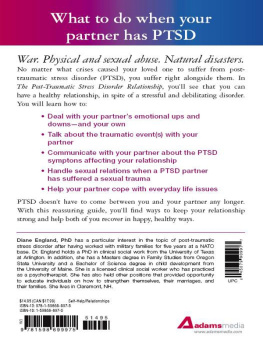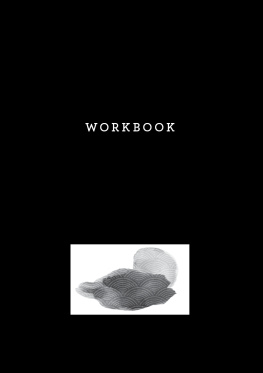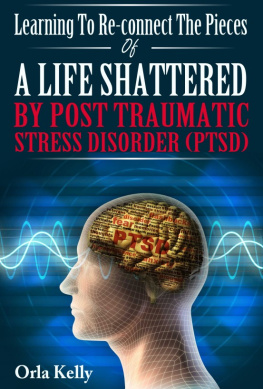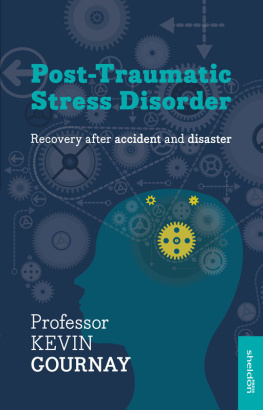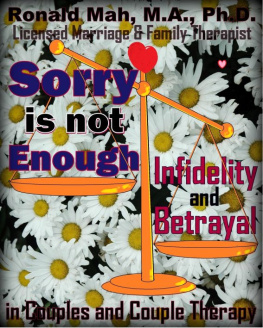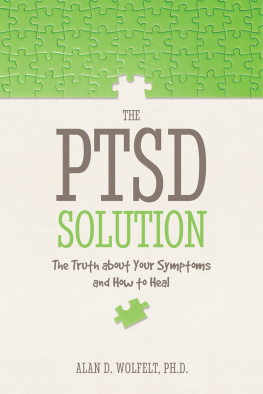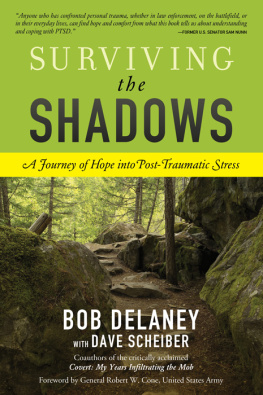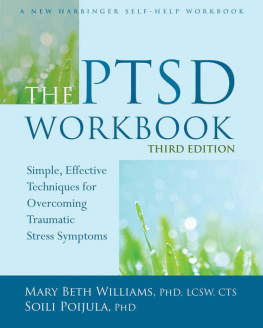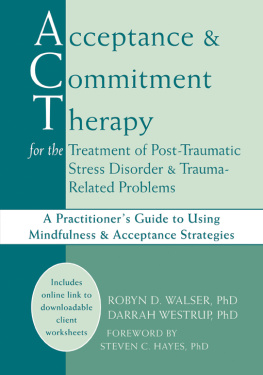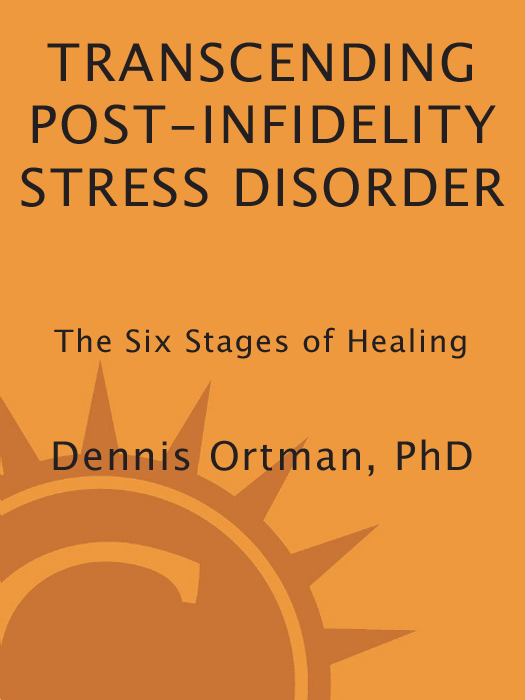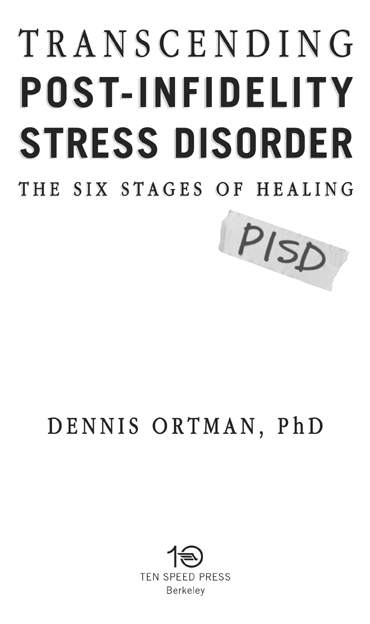Copyright 2009 by Dennis Ortman
All rights reserved. Published in the United States by Celestial Arts, an imprint of the Crown Publishing Group, a division of Random House, Inc., New York.
www.crownpublishing.com
www.tenspeed.com
Celestial Arts and the Celestial Arts colophon are registered
trademarks of Random House, Inc.
Poem on reprinted by permission of the publishers and the Trustees of Amherst College from The Poems of Emily Dickinson, Thomas H. Johnson, ed., Cambridge, Mass.: The Belknap Press of Harvard University Press, Copyright 1951, 1955, 1979, 1983 by the President and Fellows of Harvard College.
Excerpt on copyright Watkins Publishers. Used by permission.
The Tao Te Ching (trans: Ralph Alan Dale) (Watkins Publishers, London, 2005).
Library of Congress Cataloging-in-Publication Data
Ortman, Dennis C.
Transcending post-infidelity stress disorder (PISD) : the six stages of healing /
by Dennis Ortman.
p. cm.
Includes bibliographical references.
Summary: A psychologist uses post-traumatic stress disorder as a model for
the partner wounded by infidelity to explore rage and emotional pain and
to learn the secrets of recoveryProvided by publisher.
1. Adultery. 2. Self-help techniques. I. Title.
HQ806.O78 2009
248.844dc22
2008033607
eISBN: 978-0-307-80780-9
v3.1

In memory of Winifred Ennis, mother and friend,
and Rob Ortman, brother and Great Soul.

CONTENTS

Symptoms of Post-Infidelity Stress Disorder (PISD)
Imprisoned in Hurt and Rage
Differing Responses of Men and Women to Infidelity
The Many Faces of PISD
Those Most Vulnerable to Trauma
A Heart Close to Breaking
Adult Children of Unfaithful Parents
The Pain Goes On
Stage 1: Calming the Emotional Storm
Finding a Safe Haven within Yourself
Stage 2: Understanding Your Unfaithful Partner
Why? Why Me?
Stage 3: Seeking Self-Understanding
The Truth Will Set You Free
Stage 4: Making a Wise Decision
To Be or Not to Be with Your Partner
Stage 5: Embracing Self-Forgiveness
Freeing Yourself to Love Again
. Stage 6: Forgiving Your Unfaithful Partner
A Healing Journey
ACKNOWLEDGMENTS

No one stands alone. We are all related, interconnected. Our lives are shaped in many ways, known and unknown, by everyone we encounter, up close and from afar. I want to acknowledge those who helped shape this work. I am grateful to my family who endured my absences and obsessing about the book yet still loved and supported me through the process. They continue to teach me the way of love. I am especially grateful to my wife, Francesca, who persistently offered encouragement, insight, and wise criticism. I am indebted to my supervisors, Paul Kaye and Bernard Mikol, who helped me understand human nature and the ways of healing. I am grateful to Ray Sayers and Mark Ortman for our discussions on religion and the ways of the Spirit. I want to thank Doug Childers who contributed immensely to making the manuscript a readable book. I also owe a debt of gratitude to the editorial staff of Celestial Arts, and especially to Lisa Westmoreland, who offered expert guidance throughout the publishing process. Finally, I want to thank my patients who shared their lives and trusted me enough to accompany them on their healing journeys.
PREFACE

Nothing cures like time and love.
LAURA NYRO
I have firsthand experience with infidelity. I was unfaithful and have struggled for years with a heavy burden of guilt. Let me tell you my story. With admiration for my parish priests and encouragement from my family, I entered high school seminary at age thirteen. My heart was filled with love and devotion for the Catholic Church and the priesthood. I wanted nothing more than to serve the Church and her people as a priest for the rest of my life. Through my years in the seminary and theological studies in Rome, my devotion deepened, and I embraced celibacy as a way to be more available for the service of Gods people. However, as the years passed and I served in various parishes in the Detroit area, I felt a deep loneliness that could not be remedied by my spiritual exercises or friendships. I became friends with a woman. As our friendship deepened, I felt longings to spend the rest of my life with her. But such a choice would involve giving up the priesthood I loved and breaking a promise I had made to the Church.
I struggled with that decision for three years in weekly therapy, prayer, and spiritual direction. I was torn between two loves, and I saw myself as being unfaithful to my commitment to the Church. In the discerning process, I faced my guilt for not keeping my word and my anxiety about beginning a new life at age forty, after living in the refuge of the Church for twenty-seven years as a seminarian and priest. Each day I prayed fervently for the gifts of the Holy Spirit: for wisdom and counsel to make the right decision, for knowledge of Gods will for me, for apprehension of the veil of self-deception, and for fortitude (courage) to live out my decision. After three agonizing, yet liberating years, I decided to leave the active ministry and get married.
After leaving the priesthood, the crisis did not end but deepened. I encountered new challenges in being married with three stepchildren and starting a new career as a psychologist. I also grappled with feelings of profound grief for the loss of my former life, with all its joys, sorrows, and familiarities. The guilt was a constant companion, and I was wracked with anxiety about whether I would succeed in my new life, with all the financial pressures. I was also angry with the Church for all its rules and at myself for failing at my lifelong dream. Each day I prayed with a full heart for guidance and forgiveness. I also continued to pray for the gifts of the Holy Spirit, especially for wisdom and patience with myself and my family and generosity and faithfulness in my new life.
My personal soul-searching was paralleled in my new career as a psychologist. I graduated from the doctoral program in clinical psychology at the University of Detroit-Mercy. There is an interesting irony in my educational pursuit. While the University was a Catholic, Jesuit-run institution, the clinical psychology program was psychoanalytic. The program followed the tenets of Freud, sharing his suspicion of religion as a neurotic escape from reality. The personal irony for me was that I spent most of my life embracing religion and studying theology yet was being trained as a psychologist to dismiss them. In my subsequent professional work as a psychologist in private practice, I felt deeply the lack of soul (psyche). I felt alienated from the Catholic Church, like an outcast. That sense of alienation propelled me to search for wisdom from the Eastern, nonJudeo-Christian approaches to spiritual living, particularly Buddhism, which Buddha said was about suffering and its relief. That approach mirrors what I am trying to achieve in therapy. To my amazement, I discovered a large common ground between Christianity and Buddhism, particularly in spiritual practices, ethics, and the belief in the sacredness of all creation in general, and human beings in particular. My explorations led me further to study other religious traditions, such as Sufi, Taoist, and Native American. In the process, I have come to appreciate the rootedness of these many religious traditions in the universal human spirit. With renewed enthusiasm in my work, I have attempted to integrate psychology and spirituality in my therapy. My firm conviction is that Gods grace builds on and perfects human nature. However, I now think of God, less in denominational terms, but as the Great Mystery and Source of Life, beyond any conceptualizations. Our talk about the Supreme Being is really a feeble attempt to articulate a profound experience of the Divine, just a finger pointing at the moon.



